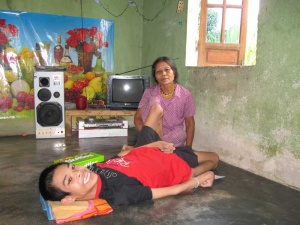
Le Van Bac, 24 years old, with his mother who is suffering from cervical cancer. His father and two older brothers are all dead due to cancer. Mom and Dad were Vietcong fighting in A Luoi Valley during the war. Photo by Henry Liem
A Luoi Valley, June 7, 2010.
After visiting several deformed children allegedly due to Agent Orange’s dioxin in this valley, I walked past the meat stand in the middle of the A-Luoi central market in the late afternoon to conclude my trip. I looked at a saleslady who seemed rather content and quiet. Something told me that I had to talk to this woman. I greeted her, and she replied with a big friendly smile. I began asking questions. The economy, the living standard, the supply sources of the meat she was selling, the people, and about her life in general.
Then, “Sister, have you heard of Agent Orange?”
She sat up from her seat, “Oh, yes, of course. We are living in the middle of that problem.”
“Do you personally know of any victims?”
“Yes. There, there!” She pointed her fingers toward other saleswomen in the middle of the fish and meat section, one woman after next. As we talked, the curious crowd began to gather. One younger woman yelled at me, “Agent Orange, I’ll show you the deformed children on this block of the street!”
More people came to listen. Almost all were women. They surrounded me. A spontaneous crowd had formed.
Energy surged from beneath these weather-beaten tough faces – as if they were surprised and relieved that some one was ready to talk about and cared about their stories. Many just kept chatting loudly about their experience in the war, the suffering they went through. These were the personal witnesses to a story that had become just another footnote to the Vietnam War, which everyone was trying to forget. I was so engulfed in their narratives, their emotion. They didn’t read from a script written by someone else. These women, tough women, as mothers, spoke from their whole lives, from their true beings.
One lady touched my arm, “Uncle, here is one victim.” I looked to her left. A lady holding a child, an apparently deformed child, in her arms, standing there looking at me with great sadness, as if she wanted to say something to me but couldn’t put it into words. The crowd turned quiet. Another asked me to visit another family nearby.
Before going with them to the house on the other side of the street, I looked at the crowd and firmly asked, “How do you know for sure that these are the victims of Agent Orange?”
The crowd turned kind of angry, “If not, tell us, then what is it? We never had these kinds of diseases, these problems before the war. They all have the same diseases. What do you think they are?”
I answered them, “I don’t know! I just want to ask you. Tell me what you know.”
At the house, a lady holding another deformed boy, her grandchild, came out to greet me. I sat down with them and began my usual “interview.” I felt like I was being rude to her. But when I asked her what she wanted for her grandchild, she began to cry. Her grandchild received no help from the government at all, she said. But that is not a big problem, she said, sobbing. What is the future for her grandchild? She wanted him to have a normal life just like any other boy in the neighborhood. Seeing other boys his age playing, she just couldn’t bear the pain of looking at her grandchild.
“I want him to be able to stand up and walk. But that is a distant dream which could never be real. Why?” She cried openly. I picked up a glass of water on the table and looked away from her. She looked at me again asking, “Why?”
As I looked west, and south, the Hochiminh Trail is now a straight and paved highway with light poles and traffic signs. The scenery looked so beautiful in the late afternoon’s bright yellow sunlight. Those mountain tops, oh yes, one of them was ” Hamburger Hill.” The jungle seemed to be in full display – so green, so fresh, so alive with living things. The rice paddies, the old helicopter runway, the firebase. All were covered with trees and green grass. I saw no war, no killing, and heard nothing of that distinctive Huey chopper’s sound of years past.
But I did hear one thing loud and clear. The legacy of that war that we all wanted to forget was here with us in the middle of the amazingly beautiful A Luoi valley. The real story had never been told by these suffering people. It was their turn now. They should tell us what was going on. And we, the world, this time, must listen.
(Thanks Hong, Thu Ha and Joy who were with me witnessing all this.)






